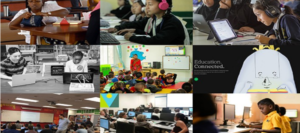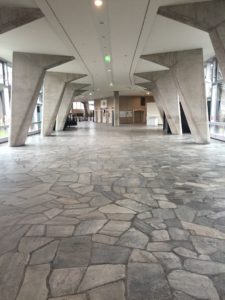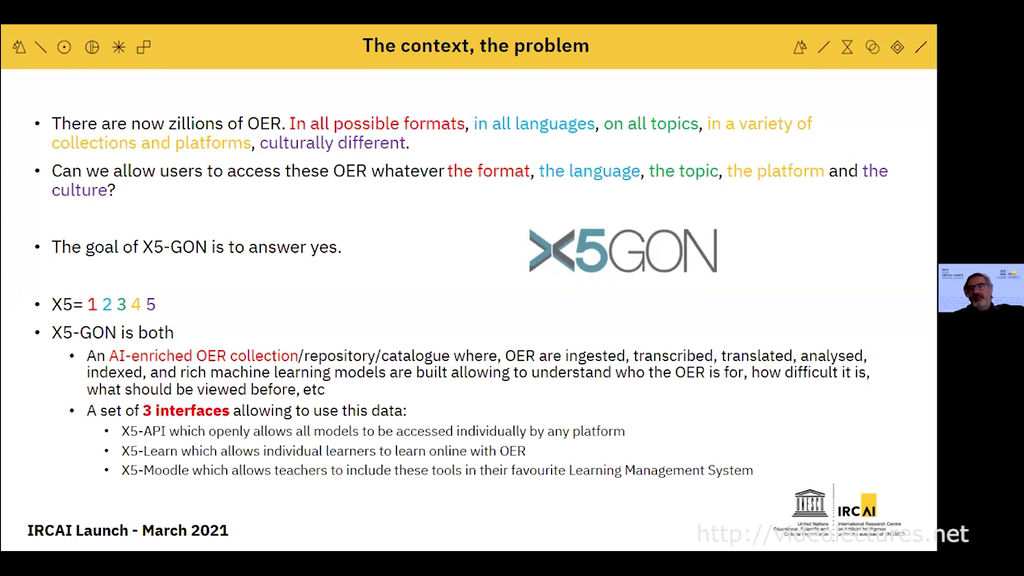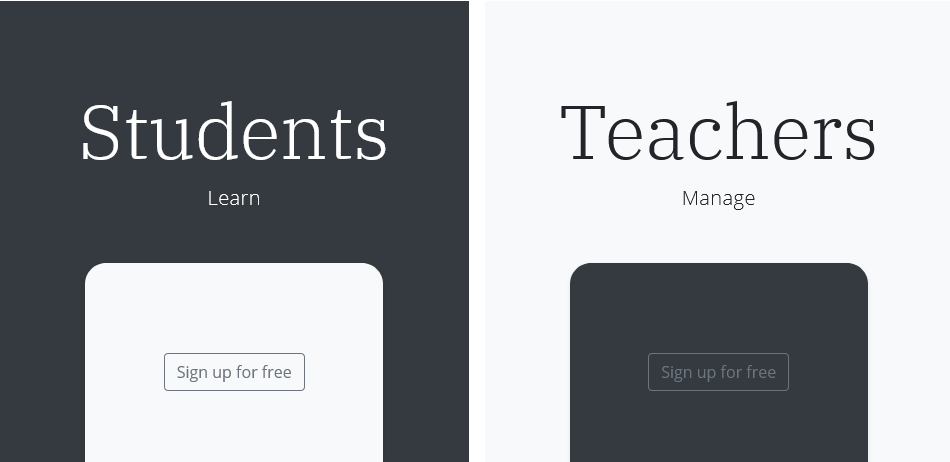News
The project has developed a commoditized set of tools and systems that enable the ingestion of OER material into the X5GON registry including semantic cross-lingual indexing of materials, automatic transcription and translation of recordings, assessment of how engaging the material is, and potentially how it might sequence with other OERs.
Further, methods for automatically estimating the knowledge of users based on their track record of viewing different OERs enables the system to recommend content that is likely to engage and prove useful for learners and teachers.
For example, a moodle plug-in can provide such recommendations at the level of a particular course, while the X5learn system can make recommendations to individual learners based on their earlier viewing experience.
The project has actively engaged with OER sites and developed systems to assist with the incorporation of OERs into the X5GON registry significantly growing the number of sites and materials that are indexed by the X5gon tools.
The following are the main technological assets the project produced:
| Research and Technology Impact | Main Research and Development products and services |
| X5GON Connect | Service connecting OER repositories across the world into a single network. Within the network, the Connect Service is able to identify how a user is navigating between OERs on the same or across other repositories, thus enabling user pattern analysis. The service is being developed to its full functionality (TRL 9). |
| X5GON Discovery
|
AI-powered search engine [29] that enables learners to discover learning materials. It enables finding OERs by type, license, and language. In addition, the X5GON team partnered with Creative Commons and integrated their Creative Commons Catalog API, thus supporting searching through CC licensed images. The service is being developed to its full functionality (TRL 9). |
| X5GON Recommend | Aligning learning materials with learner context by finding other OERs they are likely to be interested in. The recommendation plugin is a component that allows users to find materials that are related to the OER they are currently observing. The service is being developed to its full functionality (TRL 9). |
| X5GON Feed | Providing quality data to further research in open education. The public X5GON API enables accessing OER metadata, transcriptions and translations, as well as the models and services described above. The service is being developed to its full functionality (TRL 9). |
| X5GON Translate | Providing high-quality automatically generated translations of learning materials beyond borders. This is achieved through the use of the Media Transcriptions and Translation Platform, supporting several languages and focusing the development of high-quality translation models for minority languages. The service is being developed to its full functionality (TRL 9). |
| X5Learn | An intelligent learning platform that bridges the right educational resource to the right user at the right time within a futuristic user interface. The service is being developed to its full functionality (TRL 9). |
| X5GON TrueLearn | A scalable, transparent educational recommender for lifelong learners. The service is being developed to its full functionality (TRL 9). |
| X5GON Moodle | A Moodle plug-in to use X5GON technologies to build learning activities. We are running a Moodle on Posta Slovenija machines with a mock lecture “AI and the climate change”. The service is being developed to its full functionality (TRL 9). |
| X5GON Blind | A prototype learning environment for the blind and visually impaired. The environment leverages existing technologies adapted for the visually-impaired and integrates X5GON TrueLearn to provide recommendations. The service is being developed for system prototype demonstration (TRL 7). |
| X5GON datasets | X5GON has released several datasets that can be used to approach some of the previously mentioned technical challenges. As the project approaches its end more datasets will be released. |
| X5GON Github | The repository including all the public code of the project stating it as “The World’s first ecosystem connecting Open Educational Resource sites for the collective benefit of everyone, everywhere”. |
| X5GON Crawlers | The crawlers we developed are a tailored product for each OER repository, currently used by partners at JSI, NA and outside ventures such as MIT and University Bologna. They systematically browse OER sites as a remedy for no snippet integration to update their web content or indices of others sites’ web content. The service is being developed to its full functionality (TRL 9). |
On 29 March 2021, Borut Pahor, President of the Republic of Slovenia, and Audrey Azoulay, Director-General of UNESCO, inaugurated the International Research Centre on Artificial Intelligence (IRCAI), as a Category 2 centre under the auspices of UNESCO in Ljubljana, Slovenia.
Colin de La Higuera, PC Chair in AI and Education presented the work of the international scientific committee focus on AI algorithms that can make Open Educational Resources more accessible and easier to use, based on X5GON.
We have released all our scientific reports and here we are briefly listing the ones we feel are the most important ones. These combine the work in artificial intelligence and open educational resources:
- Advanced Content Representations
- Evaluation methodologies for content representation models and release of datasets for measuring quality of OERs
- Selected models and content representation models
- Evaluation Report
- X5GON products and services
- Learning Analytics Engine 3.0
- Prototype of recommendation engine
- Prototype of cross-language recommendation engine
- Piloting of use cases
- Study in-the-wild of OER user Experience, Engagement and Enjoyment
X5GON has released a platform and assistant for the visually impaired. It helps visually impaired students learn faster and more efficiently by learning and presenting their preferences.
X5gon has been selected as a finalist of the 2019 UNESCO King Hamad Bin Isa Al-Khalifa Prize for the Use of ICT in Education.
Funded by the Kingdom of Bahrain, the Prize recognizes individuals and organizations that use digital technologies to expand educational and lifelong learning opportunities. The thematic focus of the 2019 edition is the Use of Artificial Intelligence to innovate education, teaching and learning. An international Jury, consisting of five recognized experts, annually selects two laureates and eight finalists.

The 2019 ICT Prize recognizes eight nominees using Artificial Intelligence in Education
The Jury of the Prize has shortlisted X5gon among the top 10 out of 113 nominations. Our nomination has been recognized for its high quality and innovative use of Artificial
Intelligence in education.

UNESCO empty during Mobile Learning Week 2020
X5GON partners with our two UNESCO Chairs in OER are helping launch UNESCO a Dynamic Coalition for the OER Recommendation on 2 March 2020 at UNESCO Headquarters, Paris, during the cancelled Mobile Learning Week.
The Dynamic Coalition will aim to expand and consolidate commitments to actions and strategies as well as reinforce international cooperation among all stakeholders in the 4 areas of the UNESCO OER Recommendation: i) Building the capacity of stakeholders to create, access, re-use, adapt and redistribute OER; ii) Developing supportive policy; (iii) Encouraging inclusive and equitable quality OER; and (iv) Nurturing the creation of sustainability models for OER.
X5GON is assumed to be the underlying technology for the implementation of the new Recommendation, check it on the UNESCO official website.
One of the relevant exploitation results of the X5GON project is also the work of the partners on international outreach, working with UNESCO Headquarters in preparing the UNESCO Recommendation in Open Educational Resources (OER), as well as the establishment of the International Research Centre on Artificial Intelligence in Ljubljana. The agreement to establish the Center was signed yesterday at one of the X5GON partner sites, the Ministry of Education, Science and Sport by Minister Jernej Pikalo.
Great stuff! Congrats and well done to the teams from the University of Nantes and University Osnabruck for winning the competition and to UCL and Jožef Stefan Institute for taking part and presenting their solutions, apps and great ideas to the jury. We are as well extremely grateful to our jury Prateek Sibal, Ha Cole, Husna Ahmad, Kai-Uwe Kuhnberger and our panel of experts Katie Evans, Atia Rafiq, Zineb Mekouar, and Davor Orlic for being here in Paris and selecting the winning teams.
Finally, as our great colleague, Louisa Zanoun from the British Embassy in Paris mentioned in her posts “warm thanks to the wonderful Sasha Rubel from UNESCO for her inspiring keynote speech which reminded us that it is by working and acting together – students, academics, policy & decision-makers, industry, government, NGOs – that inequalities, including gender imbalance in the tech sector, can be addressed and hopefully reduced”.
Many called it their most innovative and impactful event of 2020 – the X5GON hackathon at British Embassy in Paris using the #x5gon platform and #opendata #scienceandtechnology #ai #machinelearning #OER with a view to help #ngos and #policymakers make knowledge, education and healthcare more accessible in developing countries. We would like to thank our great colleagues at X5GON without whom this hackathon couldn’t have happened Sahan Bulathwela, John Shawe-Taylor, Colin de la Higuera, Davor Orlic, Kristijan Perčič and colleagues from UCLIC Sheena Visram and UCL Computer Science Dr Dean Mohamedally and finally Zineb Mekouar who was hosting us at the Parisian incubator The Family for our first hacking day and of course, all of course all the Osnabruck, Nantes, UCL and JSI students competing.
The Spanish partners from UPV have developed the MT systems that are on par with Google Translate for most language pairs, but exceptionally ahead for Slovenian ↔ English. This is solid evidence that we achieved effective cross-lingual support that came from state-of-the-art MT systems adapted to the X5GON domain. Read the official scientific report.






























